Ljubljana related
Skupini delfinov si delita Tržaški zaliv
Dolphins share the Gulf of Trieste
Written by Dr. Katja Žerjavič., translated by JL Flanner
Delfine najbolj ogrožajo ribolov, onesnaženo okolje in podnebne spremembe.
Dolphins are most endangered by fishing, the polluted environment and climate change.
Na srečo pa delfini sodijo med karizmatične živalske vrste. Proučujejo jih mnogi biologi in s tem jih tudi pomagajo ohraniti.
Fortunately dolphins are a charismatic species. They are studied by many biologists, who thus help them to survive.
Nekatere vrste so kljub temu že zelo ogrožene in njihovo število se hitro zmanjšuje.
However, some species are already very vulnerable, and their numbers are rapidly decreasing.
Med njimi zaenkrat še ni velikih pliskavk. To so tisti delfini, ki živijo tudi v našem morju.
There are the common bottlenose dolphins are not among these yet. These are the dolphins that live in our seas.
Tilen Genov iz društva Morigenos je že pred mnogimi leti s sodelavci začel raziskovati družabno življenje velikih pliskavk v Tržaskem zalivu.
Tilen Genov from the Morigenos Society began collaborating with colleagues many years ago to explore the social life of large porpoises in the Gulf of Trieste.
Med drugim so opazili, da se na istem območju zaliva nahajata dve skupini delfinov, vendar nikoli istočasno. Ena skupina se je vedno zbrala zjutraj, druga pa zvečer.
Among other things, it has been observed that there are two dolphin groups in the same area of the bay, but never at the same time. One group was always meeting there in the morning, the other in the evening.
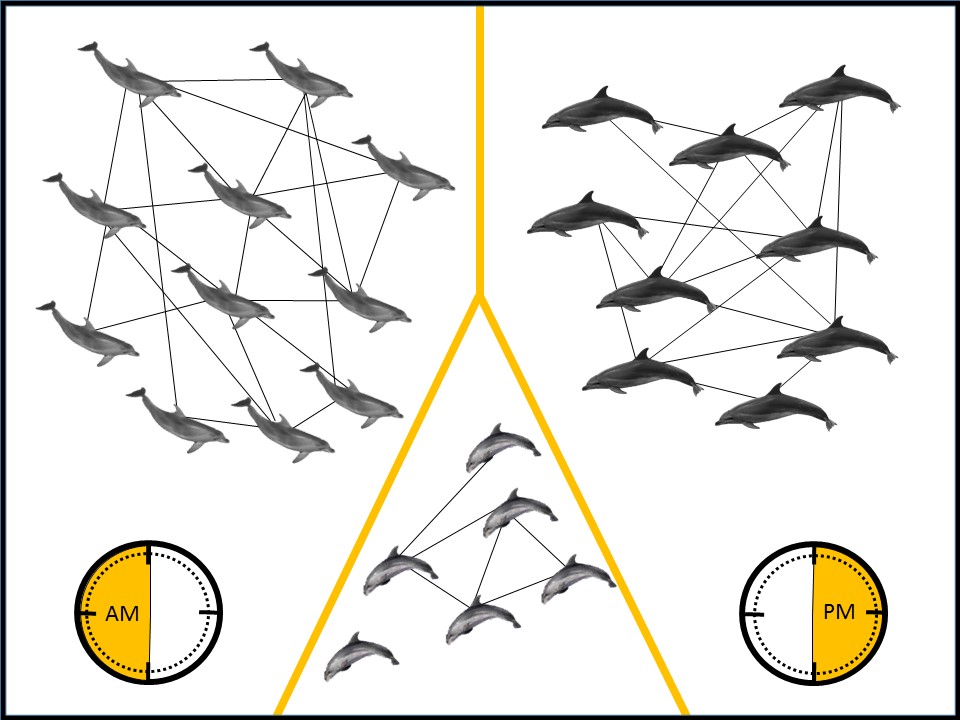
Image: Tilen Genov, Morigeno
To jih je presenetilo, saj takšnega ločevanja glede na del dneva doslej še niso zasledili.
This surprised the researchers, as they had not yet seen such segregation according to the time of day.
»Če se delfini zberejo na nekem območju vsak dan ob istem času, jih lahko ogrozita ribolov in pomorski promet,« pojasnjuje raziskovalec morskih sesalcev.
"If dolphins gather in a certain area every day at the same time, they can be endangered by fishing and maritime traffic," explains the marine mammal researcher.
»Poznavanje časovnih vzorcev je za učinkovito varstvo živali izredno pomembno. Če vemo, kdaj bodo priplavali, lahko te dejavnosti prestavimo na takrat, ko je živali manj ali ko se ravno ne prehranjujejo oziroma ko počivajo.«
"Knowing time patterns is of vital importance for the effective protection of animals. If we know when they will swim, we can move certain activities to when fewer animals are there, or when they are not eating or resting. "
Ugotovili so še, da so delfini zelo izbirčni pri tem, s kom se družijo. V vsaki skupini so bili dolgoletni prijatelji, ki pa so se delfinom iz druge skupine izogibali.
They also found that dolphins are very picky about who they hang out with. Each group was made up of long-standing friends who avoided dolphins from the other group.
Read more stories and improve your Slovene at Časoris, while all our dual texts can be found here, while all our posts on the Slovene language are here
STA, 10 January 2019 - The Slovenian word of the year 2018 is čebela (honeybee), the Research Centre of the Slovenian Academy of Sciences and Arts (ZRC SAZU) announced on Thursday. More than 2,000 votes, which is a new record, were collected in the third campaign to pick the word that left the biggest mark on the past year.
Honeybee was followed by micro-plastic (mikroplastika) and a cup of coffee, while the shortlist also included woman general (generalka), orbanisation (orbanizacija), graphic novel (risoroman), hatred (sovraštvo), texting (tekstati), tactile book (tipanka) and guard (varda).
According to Simon Atelšek, researcher of the Fran Ramovš Institute for the Slovenian Language and one of the authors of the Beekeepers' Terminological Dictionary, the Slovenian terminology in beekeeping has very few loanwords.
"This is because Slovenians have always been very advanced in this field - Anton Janša was appointed the head of the first royal beekeeping school by Habsburg Empress Maria Theresa in the 18th century - so we have been exporting our know-how rather than importing it like in law, military etc."
Another interesting fact is that "we had as many as four individual beekeepers' manuals by the mid-19th century, which is extraordinary compared to any other related field," Atelšek said.
Slovenian terms used in beekeeping reflect the great respect Slovenians feel towards honeybees, he said. While there are two different terms for dying for animals and humans in Slovenian, the term for bees is the same as for humans.
Moreover, the term for the queen bee is derived from the word mother in Slovenian.
This year, more than 2,000 people cast their vote for the word of the year in an on-line poll published on the website of the ZRC and the MMC portal, and both partners' accounts on Facebook and Twitter.
That is twice as many as last year, ZRC SAZU said.
The most innovative word of the year was also picked this year. The winning word is drečka, a bag for picking up dog poop.
Word of the year proposals are collected throughout the year and then a jury of experts makes a shortlist of ten words, which are put up for a vote.
In 2016, the word of the year was refugee and in 2017 European champions.
All our posts on the Slovenian language can be found here
Snežak na koncu Osončja
Snowman at the end of the Solar System
Written by Sonja Merljak Zdovc, translated by JL Flanner
Kaj imajo skupnega rdečkasti snežak na koncu Osončja in nova spoznanja o rojstvu planetov?
What does a reddish snowman at the end of the Solar System have to do with new insights on the birth of planets?
Na novega leta dan je vesoljsko plovilo Nova obzorja oziroma New Horizons na Zemljo poslalo prve posnetke najbolj oddaljenega nebesnega telesa v zgodovini raziskovanja vesolja. Poimenovali so ga Ultima Thule.
On New Year's Eve, the New Horizons spacecraft sent back to Earth the first images of the farthest celestial body yet encountered in the history of space exploration. It is called Ultima Thule.
Njegova oblika je posebna in nenavadna. Spominja namreč na rdečega snežaka.
Its shape is special and unusual. It resembles a red snowman.
Ultima Thule. Vir: NasaUltima Thule. Vir: Nasa
Znanstveniki v ameriški vesoljski agenciji Nasa pravijo, da česa takega še niso videli.
Scientists at the US Space Agency NASA say that they have not seen anything like this.
»Plovilo Nova obzorja je kot časovni stroj. Popeljalo nas je v čas, ko je nastalo Osončje. Opazujemo lahko rojstvo planetov, zamrznjeno v času,« je dejal znanstvenik Jeff Moore.
“The New Horizon spacecraft is like a time machine. It took us to the time when the Solar System was being formed. We can observe the birth of planets, frozen in time," said scientist Jeff Moore.
Oblika nebesnega telesa ni zanimiva le zaradi tega, ker je nenavadna, ampak tudi zato, ker bo znanstvenikom razkrila, kako so pred štirimi milijardami let in pol nastali planeti.
The shape of the celestial body is not only interesting because it is unusual, but also because it will reveal to scientists how the planets were created four and a half billion years ago.
»In to ne le tisti v našem Osončju, ampak tudi tisti, ki krožijo okoli drugih zvezd v galaksiji,« je dodal Nasin znanstvenik.
"And it's not just those in our Solar System, but also those that circulate around other stars in the galaxy," added the NASA scientist.
Ultima Thule je od Zemlje oddaljen več kot šest milijard kilometrov. Nahaja se v Kuiperjevem pasu, ki se razteza daleč za orbito Neptuna, najbolj oddaljenega planeta našega Osončja.
Ultima Thule is more than six billion kilometres from Earth. It is located in the Kuiper belt, which extends far beyond the orbit of Neptune, the farthest planet of our Solar System.
Astrofizik dr. Brian May, znan tudi kot član skupine Queen, je dvanajstletnemu potovanju plovila Nova obzorja posvetil tudi posebno skladbo.
The Astrophysicist Dr. Brian May, also known as a member of the group Queen group, wrote a special song to mark the twelve-year journey of New Horizon.
Read more stories and improve your Slovene at Časoris, while all our dual texts can be found here.
Ilka Štuhec spet na stopničkah
Ilka Štuhec returns to the podium
Written by Sonja Merljak Zdovc, translated by JL Flanner
Smučarski navdušenci so si lahko oddahnili.
Ski fans can relax.
Priljubljena alpska smučarka Ilka Štuhec se je po letu dni in pol znova povzpela na stopničke.
The beloved Alpine skier, Ilka Štuhec, is back on the podium after a year and a half.
Na smuku v Val Gardeni je prepričljivo zmagala.
She won a convincing victory at Val Gardena.
»Od srca se mi je odvalila velika skala,« je dejala smučarka po nastopu.
"A great weight has been lifted from my shoulders (literally: “a great rock has rolled out of my heart") ,” said the skier after her performance.
Dodala je, da si je zastavila visoke cilje. Zdelo se ji je, da so celo previsoki, saj jih ni mogla doseči. Ilka namreč dolgo ni smučala zaradi poškodbe kolena.
She added that she set high goals. It seemed that they were even too high, because they could not be reached. Ilka did not ski for a long time because of a knee injury.
Sedaj ji je zato lažje pri srcu. Ko je stala na zmagovalnem odru, je razmišljala: »Da je čudovito spet super smučati in stati na najvišji stopnički.«
Now it's easier for her. When she stood on the winning podium, she thought: "It's wonderful to ski again and stand on top of the slope."
Ilka Štuhec je v svetovnem pokalu sedaj zmagala osmic, petkrat je na najvišji stopnički stala prav v smuku.
Ilka Štuhec has now won her eighth World Cup, and five of these are for downhill skiing.
Po številu zmag v svetovnem pokalu je zdaj prehitela Matejo Svet in se izenačila z Bojanom Križajem. S petimi smukaškimi zmagami pa je tudi najboljša slovenska smukačica. Tina Maze je zlato medaljo v smuku osvojila le štirikrat.
In terms of the number of World Cup victories, she now has more than Mateja Svet and is equal to Bojan Kriza. With five ski wins, she is also the best Slovenian skier. Tina Maze won the gold medal only four times.
Read more stories and improve your Slovene at Časoris, while all our dual texts can be found here.
It’s time for another set of Slovenian memes (or jazjaz, as some say) to provide short, amusing texts as an aid to language learning, with these images drawn from the Internet, made by anonymous creators, and perhaps of dubious legality due to the EU’s notorious "meme-killing" Article 13. Under each there’s a translation, and you can find other articles in this series here, while a good Instagram to follow is Slovenian Memes.
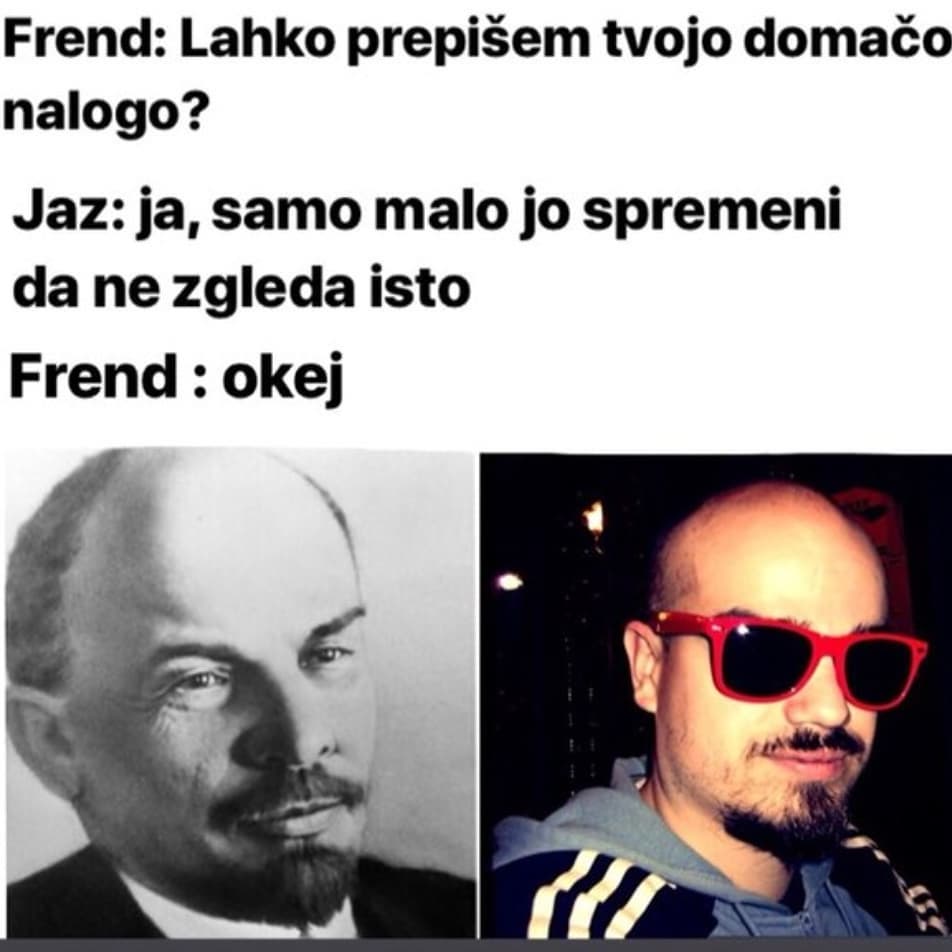
Friend: Can I copy your homework?
Me: Yes, just change it a little so it doesn’t look the same.
Friend: OK
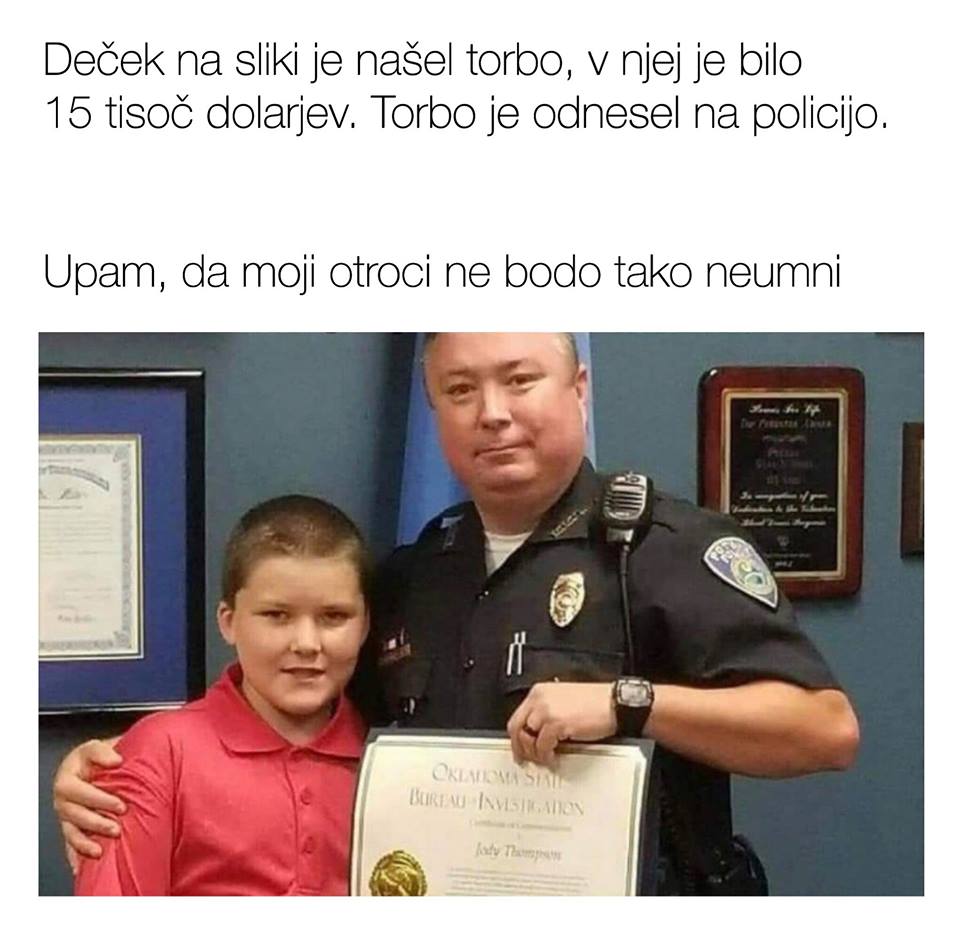
The boy in the picture found a bag with $15,000 inside. He took the bag to the police. I hope that my child is not this stupid
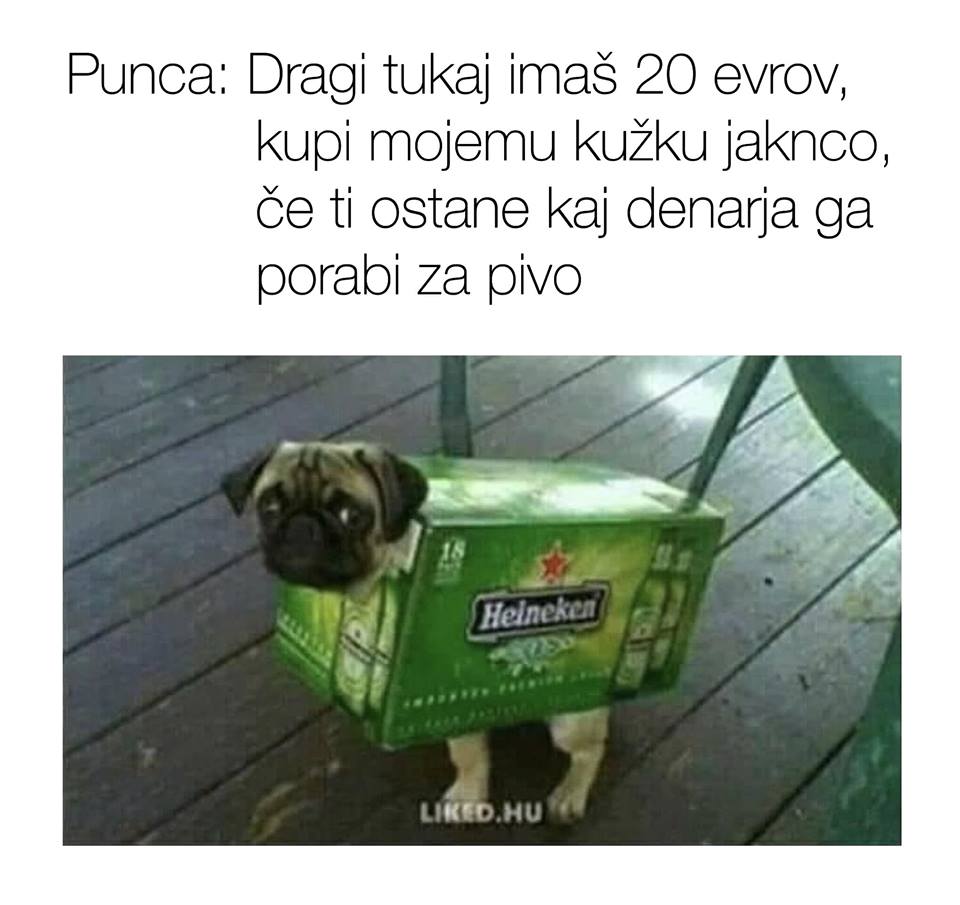
Girlfriend: Here's 20 euros to buy my dog a jacket, and if there's any money left over you can get some beer
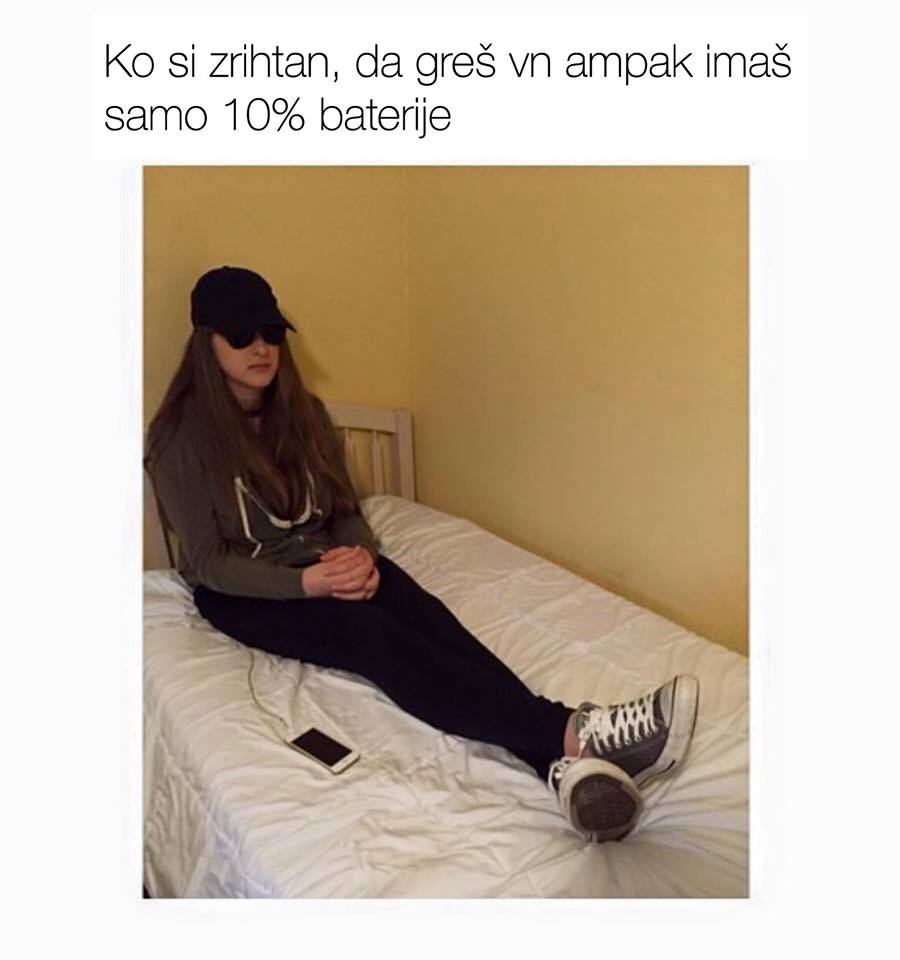
When you're all ready to go out but you only have 10% battery

When I'm hungry and walk to the fridge
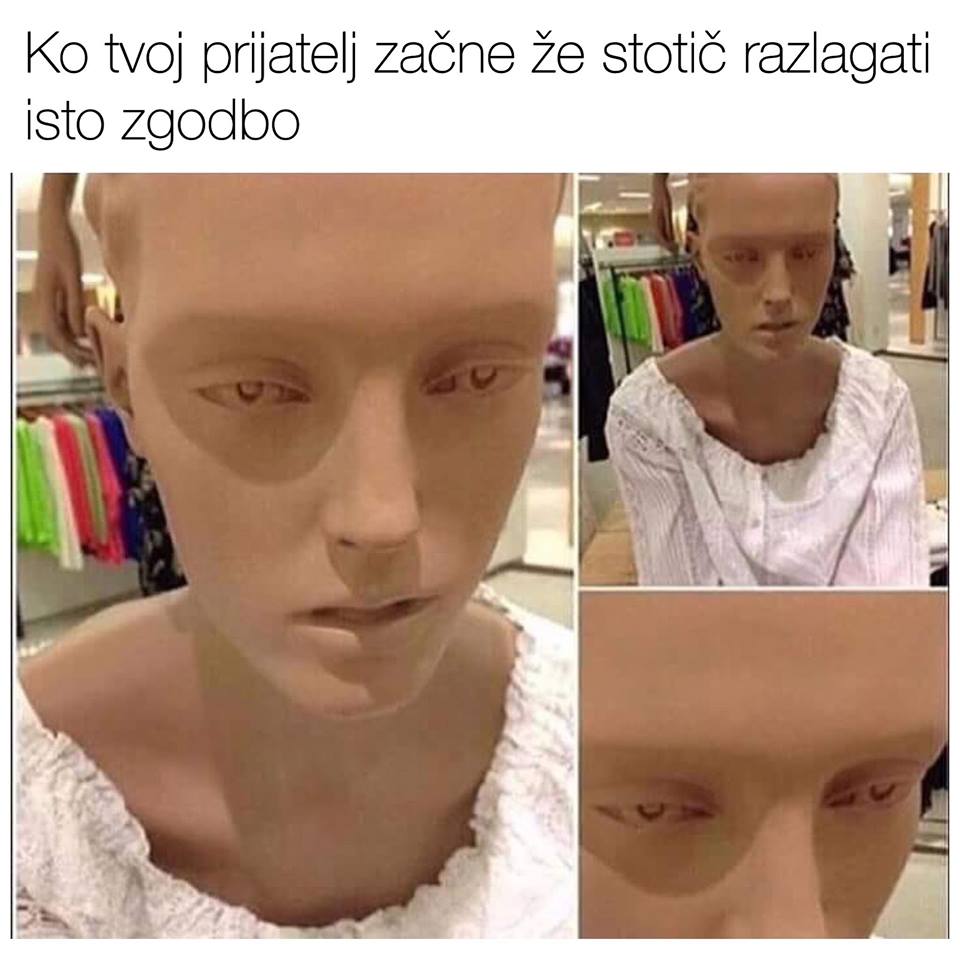
When your friend starts telling the same story for the 100th time
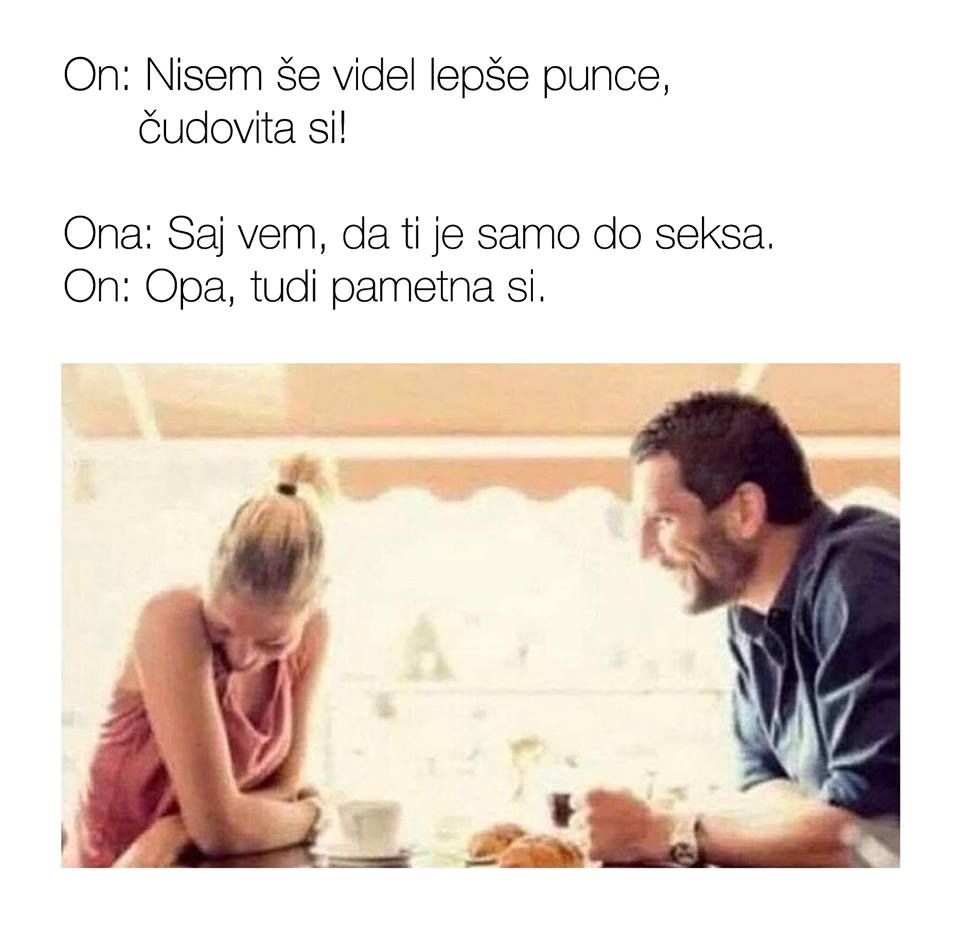
Him: I've never seen such a beautiful girl, you're wonderful!
Her: I know you're only after sex.
Him: Wow, you're smart, too.
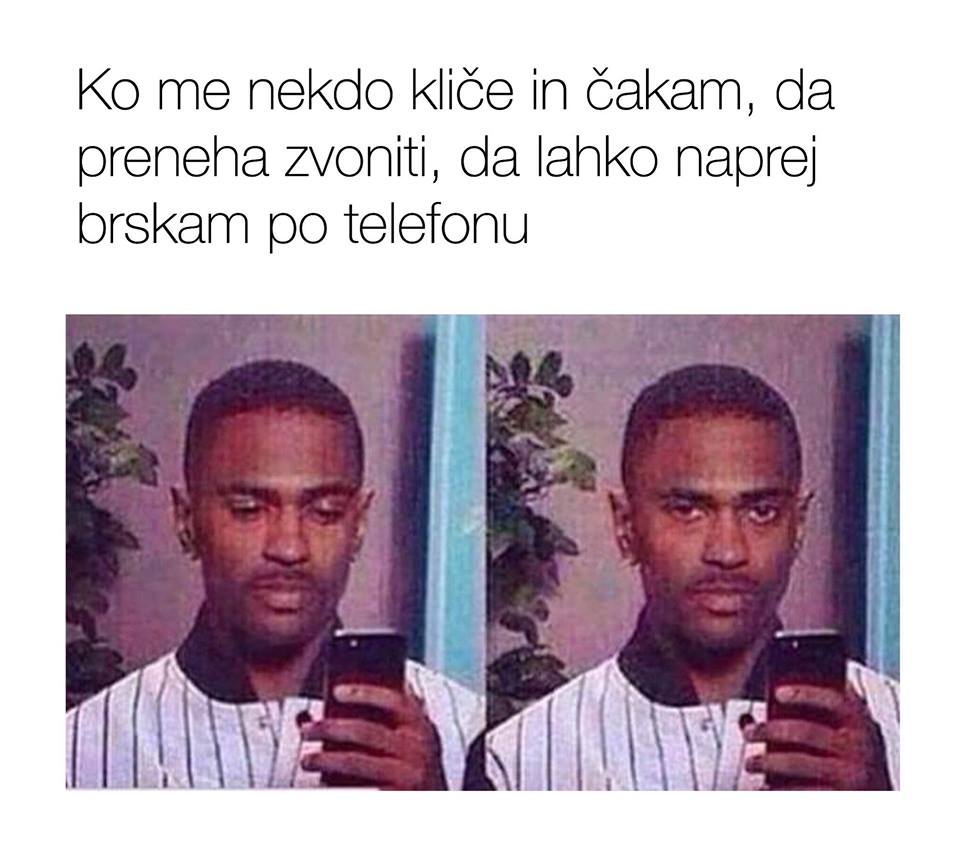
When someone calls and I wait until it stops ringing so I can continue browsing on my phone
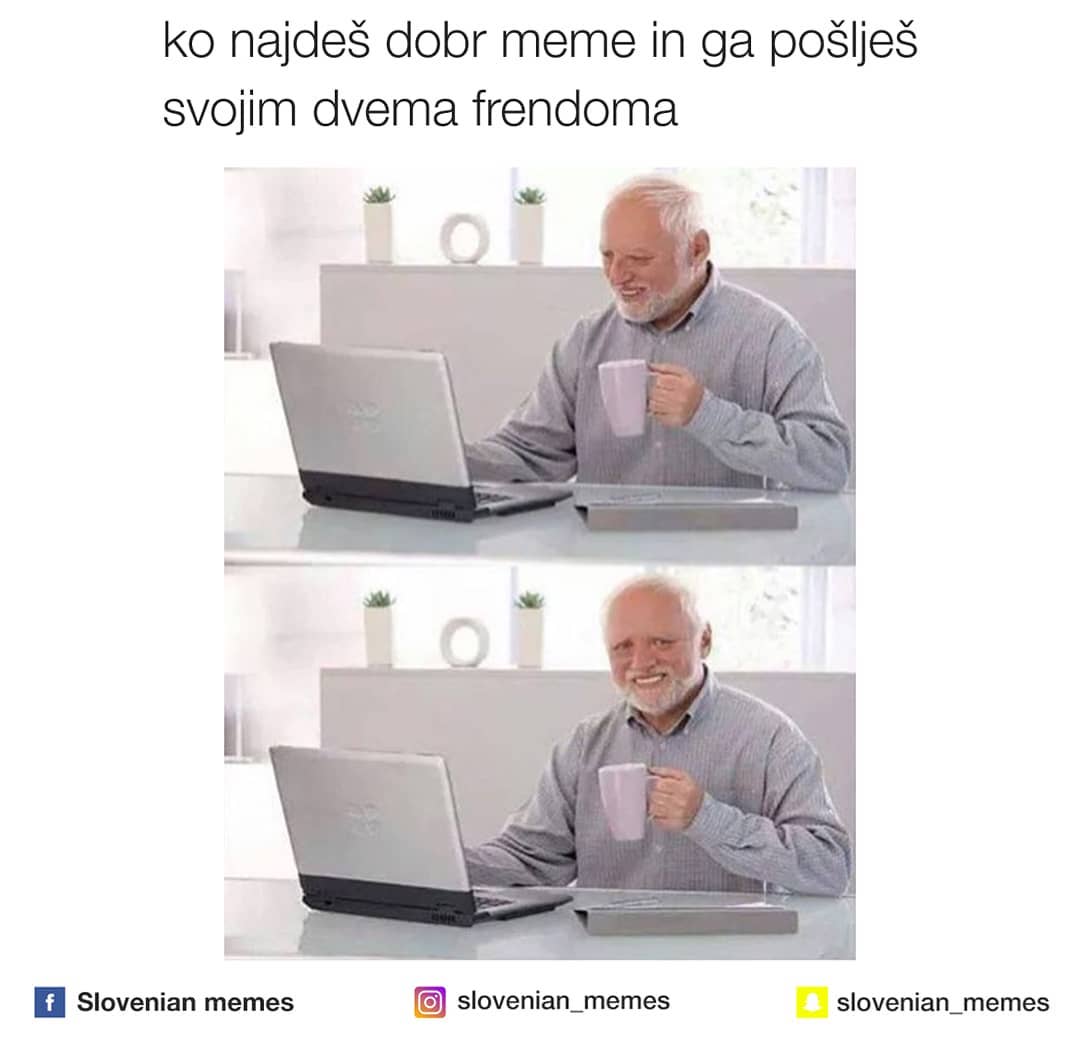
When you find a good meme and send it to a couple of friends
December 18, 2018
While Paul McCartney is said to sometimes fly in for some fishing it’s not often that a triple-A superstar visits Slovenia for show, and even rarer that they sit down for an interview with the local media. It was thus a special day in 1996 when David Bowie was in the country, and a day that was made even more special for Marcel Štefančič, the veteran journalist who over the years has written about everything from politics to cinema, but at this time got to sit down with the Starman himself. It’s a surprisingly good interview, given how Bowie couldn’t have known it would have such a wide audience, or such a long life, but for our purposes the focus is on the subtitles and their educational potential. So relax, maybe grab a pen and paper, and learn a little Slovene with the Dame.
Unfortunately, only a small portion of the interview is available online.
Protestirajo otroci, protestirajo odrasli
Protesting children, protesting adults
Written by Sonja Merljak Zdovc, translated by JL Flanner
Vsakdo ima pravico do izobraževanja in vsakdo ima pravico do počitka. Vsakdo ima pravico do dela in vsakdo ima pravico do takšne življenjske ravni, ki zagotavlja njemu in njegovi družini zdravje in blaginjo.
Everyone has the right to education and everyone has the right to time off. Everyone has the right to work and everyone has the right to such a standard of living that provides them and their family with health and well-being.
To med drugim piše v splošni deklaraciji človekovih pravic. Sprejeli so jo 10. decembra pred sedemdesetimi leti v Parizu.
This is said, among other things, in the Universal Declaration of Human Rights. It was adopted on December 10, 1970 in Paris.
Ob letošnjem svetovnem dnevu človekovih pravic v Združenih narodih (ZN) poudarjajo, da so človekove pravice univerzalne in večne; pripadajo vsem enako, ne glede na starost, spol ali barvo kože.
This year's World Human Rights Day in the United Nations (UN) marks that human rights are universal and eternal, and belong the same to everyone, regardless of age, sex or colour of their skin.
To na primer pomeni, da imajo tudi otroci pravico do zdravega življenjskega okolja.
For example, this means that children also have the right to a healthy living environment.
Odrasli na to pogosto pozabijo. Otroci jih zato vse glasneje opozarjajo, naj vendar poskrbijo za okolje in s tem za prihodnost otrok in planeta. Ker jim niso prisluhnili, so denimo že protestirali otroci na Švedskem in otroci v Avstraliji.
Adults often forget about this. Children are thus warning them, loudly, that they should take care of the environment and thus the future of both young people and the planet. For example, because adults ignore them children in Sweden and Australia have already protested.
In tudi zdaj ne kaže, da se bodo svetovni voditelj uspeli dogovoriti, kako bodo na primer izpeljali, kar so sklenili pred tremi leti v Parizu.
And now it does not seem like global leaders will succeed in agreeing on how to achieve what they set out three years ago in Paris.
V tem mestu pa sedaj že več tednov protestirajo odrasli v rumenih jopičih.
Now in the same city, for weeks now, people in yellow jackets have been protesting protest.
Na ulice so se odpravili, ker je francoska vlada želela zvišati cene goriva. Zbrani denar je želela nameniti ravno zaščiti okolja. A ljudje so se uprli, ker menijo, da si goriva po taki ceni ne morejo privoščiti.
They went to the streets because the French government wanted to raise fuel prices. The aim was to collect money to protect the environment. But people resisted because they felt that they could not afford fuel at this price.
Vlada se je nato odločila, da goriva ne bo podražila.
The government then decided not to raise the price of fuel.
Kljub temu so se protesti v Parizu nadaljevali. Protestniki zdaj zahtevajo nižje davke, višjo minimalno plačo in več ugodnosti za upokojene. Njihovi pohodi niso več mirni, saj pri tem sežigajo vozila in razbijajo izložbe. Tudi ta konec tedna je bilo nekaj ljudi celo ranjenih.
Nevertheless, the Paris protests continued. Demonstrators now demand lower taxes, a higher minimum wage and more benefits for retired people. Their marches are no longer peaceful, as they burn vehicles and break up store displays. This weekend there were even some people who were wounded.
Read more stories and improve your Slovene at Časoris, while all our dual texts can be found here.
Ukrepajmo zdaj!
Let's take action now!
Written by Dr. Katja Žerjavič, translated by JL Flanner
Ukrepajmo zdaj!
Let's take action now!
»Ukrepajte zdaj!« voditeljem držav sporoča sir David Attenborough.
"Take action now!" says Sir David Attenborough.
»Soočamo se s svetovno katastrofo, ki smo jo povzročili mi. Podnebne spremembe so naša največja grožnja,« je na sestanku o podnebnih spremembah še dejal sloviti raziskovalec narave.
"We are facing a global catastrophe that we have caused. Climate change is our biggest threat, "said the famous explorer of nature at a meeting on climate change.
»Če ne bomo ničesar storili, bo naša civilizacija propadla in večina živih bitij bo izumrla.«
"If we do nothing, our civilisation will collapse and most of the living beings will die out."
Svetovni voditelji so se zbrali na konferenci Združenih narodov o podnebnih spremembah v mestu Katovice na Poljskem. Dva tedna bodo razpravljali, kako izpolniti obljube, ki so jih dali pred tremi leti na podnebni konferenci v Parizu.
World leaders gathered at the United Nations Conference on Climate Change in Katowice, Poland. For two weeks they will discuss how to fulfil the promises they made three years ago at a climate conference in Paris.
Takrat so se obvezali, da se povprečna temperatura ozračja ne bo povišala za več kot dve stopinji Celzija v primerjavi s temperaturo pred 100 leti. Pa tudi, da bomo izpust toplogrednih plinov v naslednjih 20 letih zmanjšali za polovico.
At that time, they pledged not to increase the average temperature of the atmosphere by more than two degrees Celsius compared to the temperature 100 years ago. They also planned to cut greenhouse gas emissions by half over the next 20 years.
Politiki se zdaj o tem pogovarjajo z velikim cmokom v grlu.
Politicians are now talking about this with a big lump in their throat.
Zadnja štiri leta so namreč najbolj vroča leta, odkar uradno merimo temperaturo. Tudi količina toplogrednih plinov se spet povečuje.
The last four years have been the hottest years ever since we officially measure the temperature. The amount of greenhouse gases is also increasing again.
Mnogim opazovalcem njihovega srečanja se ne zdi prav, da so si za kraj sestanka izbrali prav Poljsko. Ta država proizvede večino svoje električne energije iz premoga, to pa pomeni, da njena električna energija ni čista. Obenem pa srečanje denarno podpirata dve veliki premogovni podjetji.
Many observers of their meeting do not seem right to choose Poland as the place of the meeting. This country produces most of its electricity from coal, which means that its electricity is not clean. At the same time, the two big coal companies are financially supported by the meeting.
Sir David danes v tej državi zastopa ljudi, ki že občutijo posledice podnebnih sprememb. Voditeljem v njihovem imenu sporoča: »Čas se izteka. Ljudje želijo, da vi, ki odločate, ukrepate zdaj. Svet je v vaših rokah.«
Sir David today in this country represents people who already feel the effects of climate change. He says to leaders on their behalf: "Time is running out. People want you to act now. The world is in your hands."
Ali mu bodo prisluhnili, bomo izvedeli 14. decembra, ob koncu konference.
Whether they will listen to him, we will find out on December 14, at the end of the conference.
Read more stories and improve your Slovene at Časoris, while all our dual texts can be found here.
Tanja Jerman and Matej Klemen are teachers of Slovene at the Centre for Slovene as a Second and Foreign Language, and have taught for quite some time in Slovenia and around the world. They are also authors of several textbooks and other publications for learning Slovene. We got in touch with them asked some questions about their experiences teaching this often challenging language.
1. People say that Slovenian is one of the hardest languages to learn. What are your thoughts?
Matej: This is a common thing to say. However, I think Slovene is just as easy or just as difficult – if you want – as any other language. Starting learning any language with the mental set ‘this is so difficult’ is definitely not helpful. If you speak another Slavonic language, learning Slovene is not difficult at all, as far as I can judge from my experience teaching Slavonic speakers. As for English speakers, it might be that they experience some difficulties when starting learning Slovene as the languages are quite different. Once they grasp the structure of Slovene, they are fine. Some of my students who speak English as their first language now work as translators from Slovene into other languages, researchers etc.
Tanja: I agree with Matej and of course disagree with the stereotype of Slovene being a difficult language. To add a couple of things, Slovene uses Latin script, has quite a few borrowed words and all this helps the language learners. At the beginning of the course, I like to tell my students that Slovene only has three tenses: only one past, only one present and one future tense. This cheers them up a bit. There might be quite a lot of endings regarding nouns and adjectives. However, if you compare Slovene to let’s say Finnish or Hungarian with their 15 or 18 cases, respectively, Slovene is a piece of cake with only six of them.
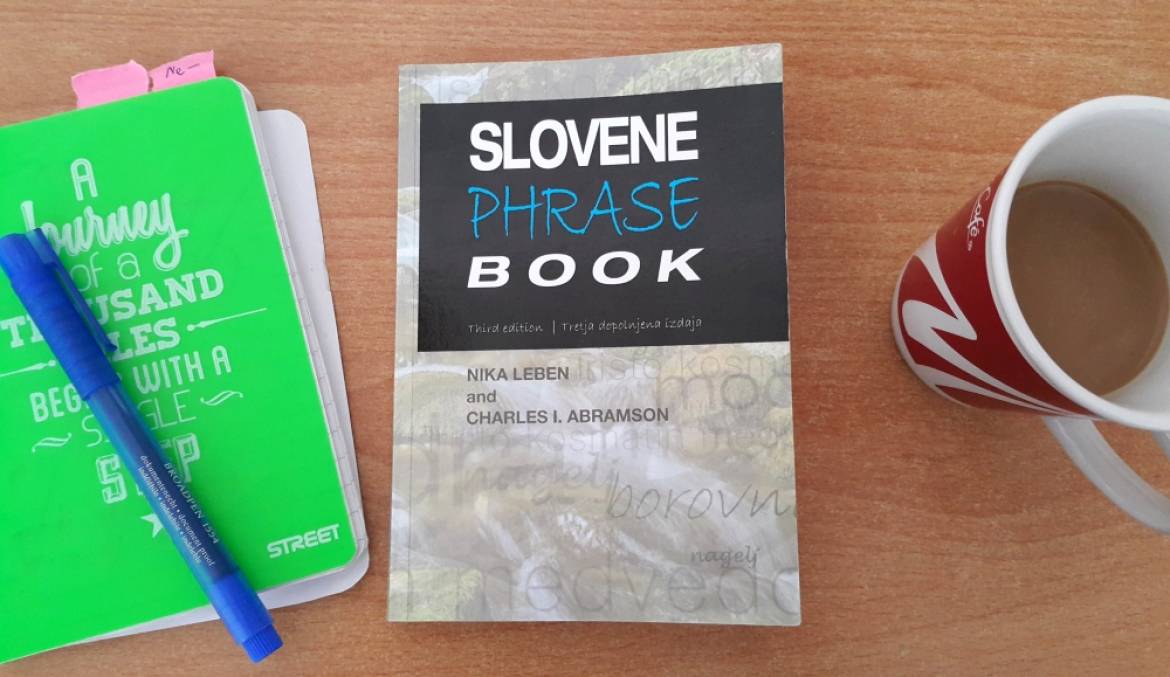
Photo: JL Flanner
Related: New Courses & Nationality Exam Prep at the Centre for Slovene as a Second & Foreign Language
2. Tell us about the typical experiences of foreigners who come to you to learn Slovenian as total beginners – the problems they face, the things they find easy, when people stop learning, etc.
Matej: Our philosophy at the Centre for Slovene is that there are practically no beginners in Slovene. Everyone knows at least something. I only once met a person who wanted to join our courses and she said she knew absolutely nothing. It turned out that she knew three Slovene words (and really only three!): sol (salt), mleko (milk), kosmiči (cereal). She picked them up from packages in the store. As a teacher, I have to see this potential and use it to facilitate learning, acquiring new vocabulary.
Tanja: Once the students grasp the phonetics of Slovene, they realise how easy it is actually to read and write in the language. However, they have to invest some time in learning vocabulary and above all they need to practice speaking. This quite often presents a problem for our students. People in Slovenia tend to switch from Slovene into the foreign language they speak, so the students of Slovene struggle to find a partner to talk to in Slovene. Thus, one of the first phrases I teach them is Učim se slovenščino. Prosim, govorite slovensko.
At the Centre for Slovene, we try to make the learning process as comfortable as possible, on the other hand also as useful and authentic as possible. At the very beginning, we teach the most frequent phrases and vocabulary, basic and useful grammar structures. We do not overburden students with exceptions, irregular verbs etc. if it is not absolutely necessary.
Matej: When do our students stop learning? I believe that when they reach the level they need, once they run out of time, money… Some of them return to our Centre again and again as the learning process is a never-ending story.
Learn about the Centre's Ivan Cankar boardgame here
3. So many foreigners seem to have a mental block about learning Slovenian, especially if they can live and work here without learning the language. How do you 'unblock' that mentality?
Tanja: As person decides to learn a new language, they are usually already ‘unblocked’ and have already made the first step. My task as a teacher is to motivate this person to make progress, to support them on their way. Every little success in communication, in comprehension (e.g. being successful in buying some fresh vegetables at the Ljubljana market in Slovene, giving a compliment to your mother-in-law, etc.) shows their progress in language learning and brings satisfaction.
Matej: There might be sometimes a person who really concentrates on speaking perfectly and not making any mistakes rather than speaking fluently or speaking at all. I try to explain that knowing all of the details of the grammar will not get them anywhere if they do not relax and speak. By creating a relaxed and supportive atmosphere in the classroom, I am usually successful in this.
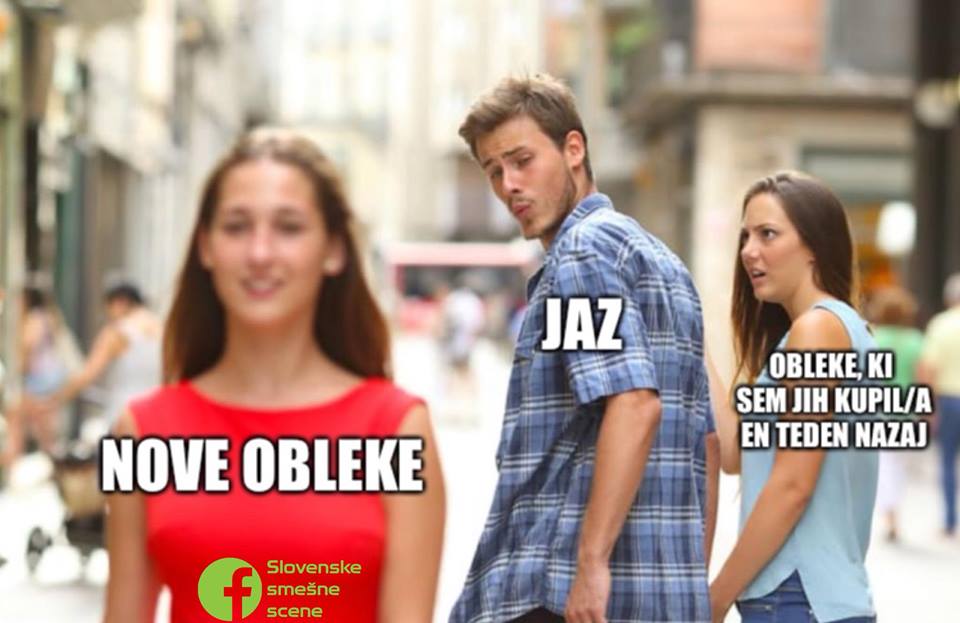
Learn Slovene with memes, with more for you here
4. Language errors can be funny. Are there any common one’s that make native speakers laugh?
Tanja: A very useful phrase, especially in summer is ‘I’m hot’. Please, do not translate it word by word! You will end up with Vroč sem! or Vroča sem! It would sound inappropriate or you might give a person the wrong impression – advertising yourself as a hot babe. The adjective vroč (hot) is normally used with weather (vroče vreme – hot weather, vroč dan – hot day). When feeling hot, use a phrase Vroče mi je. Also, I would not swear by the Google translate. I once came across a sentence Vabim te na datum., literally: I’m inviting you for a date. where the word date stands for ‘a particular day’. Google translate was not able to realise the person wanted to invite me to a different thing, i.e. zmenek.
Matej: One of the most frequent verbs is iti (to go), which is irregular. It’s really important to learn its specific forms. If you simply follow the standard rules, you might end up with a sentence like Včeraj sem grel plavat. (Yesterday, I warmed swimming.) instead of Včeraj sem šel plavat. (Yesterday, I went swimming.).
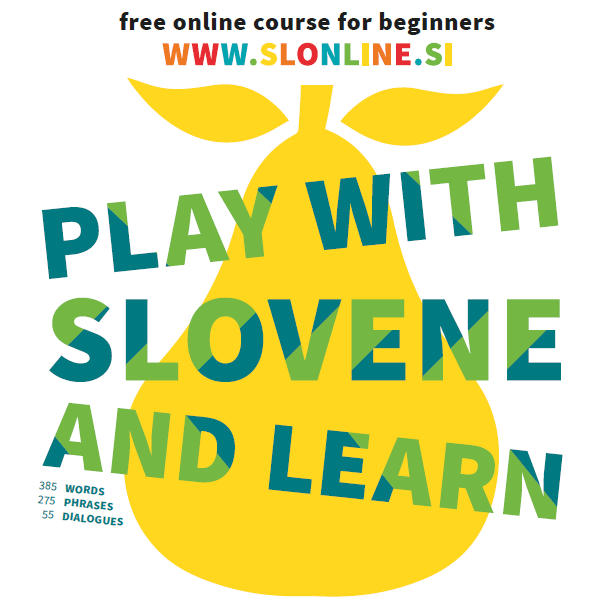
Learn more about the course for learning Slovenian online here
5. What do you find difficult about speaking English?
Matej: For me, finding the right expression can be tricky. Regarding grammar, I have always struggled with if clauses. If (!) I begin a sentence and manage not to remember it’s an if-clause, then I am OK. However, if my brain senses the sentence is an if-clause it just melts, and the result can be barely intelligible.
Tanja: Oh, don’t be silly! I told you so many times that grammar is not the most important bit of the language. However, it is true that some Slovenes tend to ignore some English grammar rules. Just listen to our English and you will hear all the difficulties we encounter in using tenses (perfect tenses specifically), definite and indefinite articles, in ignoring the difference between long and short vowels. Guess what a sheet becomes in Slovene pronunciation. We are sometimes close to the Italian guy from the following joke.
6. Learning Slovene is a serious business. Why should people sign up for a course at the Centre, and what is on offer with your language school?
Matej: The courses at Centre for Slovene have been around for more than 30 years. We are a part of the Faculty of Arts, University of Ljubljana. The Centre has an expertise in researching and developing the field of Slovene as a second and foreign language, teaching, testing and certifying language proficiency. We also publish textbooks and handbooks for teachers, organise teacher trainings. We’ve recently developed an on-line course www.slonline.si which has proved very popular around the globe as it is available in seven language combinations free of charge. In short, we really are the centre regarding Slovene as a foreign language.
Tanja: I would also like to point out our experienced teachers and quality materials. As already mentioned, we create a stimulating environment where our students reach the best results. We offer courses all year round for adults as well as for young learners, on different levels from A1 to C2, for professionals as well as language lovers. Our offer is always updated on our web site. So there are no excuses not to join us.
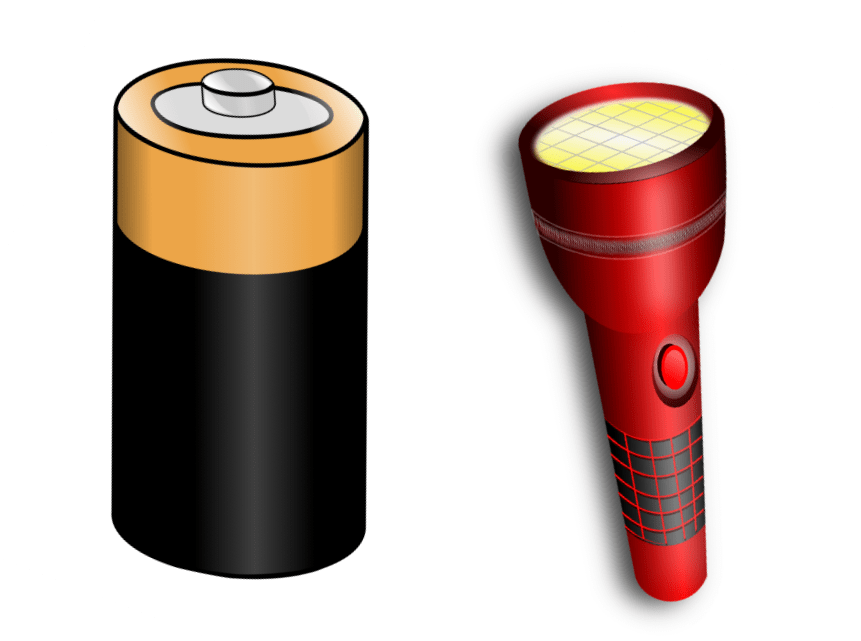
Learn some false friends in English and Slovene here
7. What’s your best advice for people learning Slovenian and thinking about giving up?
Matej: Find a minute or two every day to do something relaxing related to Slovene: listen to a pop song, watch a YouTube video, cook a recipe from a Slovene cook book, check a Slovene blog post, scroll through some news site… Something you like to do. It does not need to be a lot of time but it is important to keep the contact with the language. You have to take the initiative. You might as well follow us on our Twitter, Facebook or Instagram.
Tanja: Slovenes are very happy to hear a foreigner speaking even the basic words in Slovene. We do appreciate the effort. It is good to keep this in mind!
8. What are some Slovenian cultural products that foreigners who learn the language should be aware of?
Matej: I like to play quite a few Slovene songs in my classes. As the festive time is getting closer, my recommendation is a classic Bela snežinka. It might be a bit old fashioned but if you listen to it, you will learn some basic vocabulary and get to know a Slovene evergreen which will get you into the festive mood.
Tanja: Also, do not forget about potica – the famous festive walnut yeast-dough cake.
You can learn more about the work of the work of the Centre for Slovene as a Foreign Language, and perhaps sign up for a course, free online or in person here
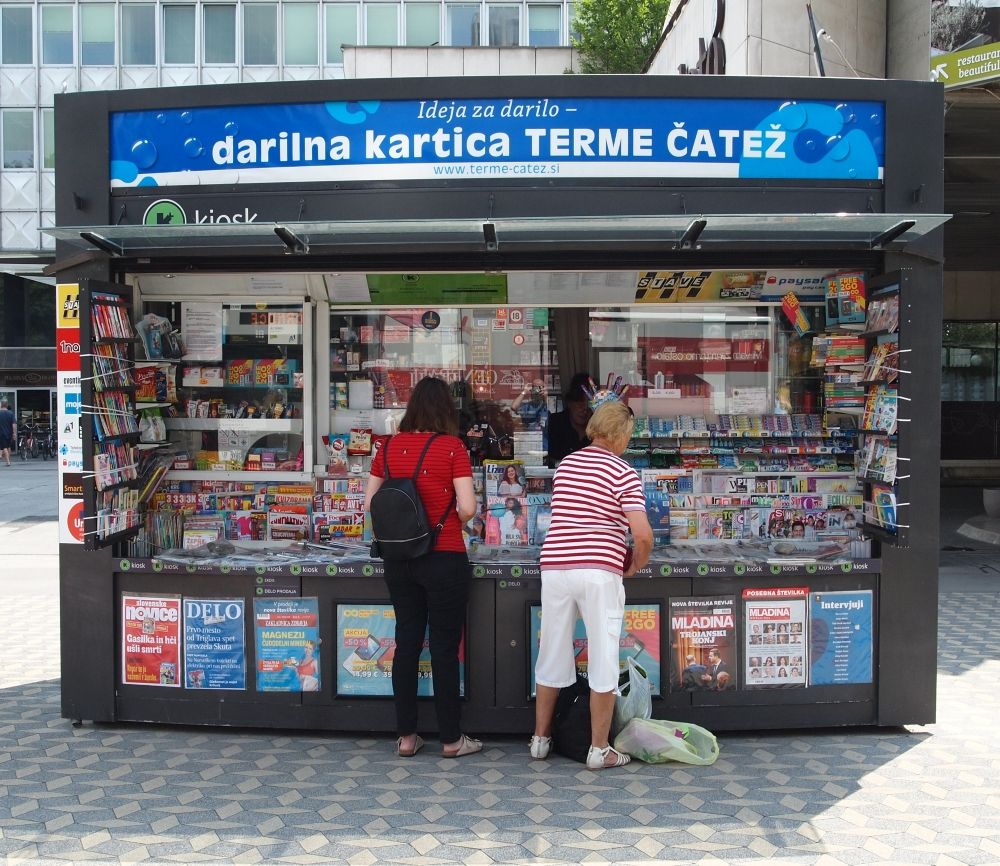
Photo: JL Flanner
Want someone to hold your hand while you're reading Slovene? Check out our weekly Slovene-English dual texts.
Z lučkami v veseli December
With lights in Festive December
Written by Sonja Merljak Zdovc, translated by JL Flanner and G Translate
Čeprav so številni trgovski centri v prazničnih lučkah zažareli že sredi novembra, se veseli december v Ljubljani začenja zadnji dan predzadnjega meseca v letu.
Although in many shopping centres in the festive lights have been burning since mid-November, we are looking forward to December in Ljubljana starting on the last day of the last month of the year.
Ob 17.15 bo župan Ljubljane Zoran Janković slovesno prižgal novoletne lučke. Gorele bodo do 6. januarja, ko se zaključijo novoletni prazniki.
At 17:15 [30 November], Ljubljana Mayor Zoran Janković will solemnly turn on the New Year's lights. They will stay on until January 6, when New Year's holidays are over.
Na Kongresnem trgu pa je že zaživela tudi zmajska Ledena dežela.
In Congress Square a dragon’s Land of Ice has also been brought to life.
Related: Turning on the Christmas lights in Slovenia
Tudi drugi kraji se bodo za dober mesec dni odeli v svojo najlepšo praznično podobo.
Other places will for a good month put on their most beautiful festive appearances.
Veseli december je namreč čas radosti in druženja, pa tudi spokoja, upanja in miru. V mesecu, ko je dan najkrajši in noč najdaljša, svetlobo v temo prinašamo prav z množico okrasnih lučk.
Happy December is a time of joy and socialising, as well as rest, hope and peace. In the month when the day is shortest and the night is the longest, we bring light into the dark with a host of decorative lights.
Letos smo veliko pozornosti namenjali tudi plastičnim odpadkom. »Ti prodirajo v vse pore našega življenja. O tem priča tudi izbor Collinsovega slovarja za besedo leta. Ta je namreč postala beseda ‘single-use’, kar pomeni ‘za enkratno uporabo‘,« pojasnjujejo naravovarstveniki, ki so zato začeli s kampanjo Plastika naša vsakdanja.
This year we paid a lot of attention to plastic waste. "This gets into all parts of our lives. The Collins's Dictionary of the word for the summer is evidence of this. It was the term 'single-use', which means 'one-time use'," explain some conservationists, who started a campaign about plastics in everyday life.
Related: December at Ljubljana Castle is full of festive spirit
In tudi zato so se organizatorji decembrskih prireditev v Ljubljani potrudili in poskrbeli, da bo embalaža, ki jo bodo uporabljali na prazničnih stojnicah, iz razgradljivih materialov.
That is why the organizers of the December events in Ljubljana made every effort to ensure that the packaging that they will use on the festive stalls will be made of degradable materials.
Iz teh bo celo ognjemet. Tako so se odločili, da bi med uživanjem decembrskih radosti čim manj škodili okolju.
This approach also extended to the fireworks that will be used. [The organisers] thus decided to minimize harm to the environment while enjoying the joys of December.
Read more stories and improve your Slovene at Časoris, while all our dual texts can be found here.


